This article is written by Abhyuday Agarwal (with inputs from Shweta Devgan, Jolly Tewari, Ehtisham Ali), Team Lawsikho.
Hey,
The biggest risk in attempting the judiciary exam is that it is a competitive exam, where there’s only “hit or miss” and nothing in between.
After the prelim, main and interview rounds, you stand either passed or failed.
If you pass, my heartiest congratulations.
If not, better start preparing for next year, if you still will.
There’s no grey area in the middle.
Something to think about, right?
So how do most candidates usually tide over this risk?
They attempt judiciary exams in multiple states.
Delhi, UP, Haryana, Rajasthan, Himachal Pradesh, Madhya Pradesh and Bihar are some of the most sought after states to crack the judicial services exam.
A common thread between these exams is that these states are a part of the Hindi-speaking belt. If you know Hindi, you can prepare for the language paper easily.
Also, there are significant overlaps in the syllabus.
The goal, therefore, is to minimize the uncertainty and risk in preparing for the judiciary exam, as seats are very few and the competition high.
If you have a bad day or face an unusually difficult question paper in one state, it can be disastrous. You can literally lose a year.
Sometimes, no vacancy arises in the state of your choice. In that case, you have no option but to simply wait for another year.
Given this situation, most candidates decide to prepare for multiple state judiciary exams.
In addition, they combine their judiciary preparation with UGC-NET and CLAT LLM preparation as well, as the subjects in the syllabus overlap significantly.
Although this strategy reduces the risk, it comes with its own set of pitfalls.
Prior knowledge of these pitfalls is important so that you can steer clear of them from the very early stages of your preparation.
If you are in advanced stages of your preparation, this knowledge can still help you in making course-corrections at this stage.
Let’s take a look at the pitfalls now.
#1 – Exam attempts without full preparation and the ‘cycle of failure’
Many candidates believe that they can appear in the exam without full preparation, just to have an experience of the exam.
After all, it’s not my most preferred state, so what is the problem? I am only attempting the exam for practice.
That’s what they think.
Others try last-minute heroic dashes. For example, they will study for 18 hours a day in the last 10 days, and give the exam on the next day.
Guess what happens?
Obviously, they don’t crack it. There is a perfect justification as well.
I only prepared last minute. I can always try again.
They give themselves another chance.
Slowly, this attitude sets into motion a vicious cycle of failure.
It starts with under-preparation, failure, a re-attempt.
Each failure reduces your self-confidence slightly, making your next attempt a weaker one.
The cycle repeats.
So, what is the way out?
If you have already been a part of this cycle, you’ve got to take a decision to stop it right now.
If you just want to practice and experience the exam, just give a mock! In fact, from June 2020 onwards, those who are enrolled in our judiciary test prep course can give a mock every week.
Ensure that your next attempt is the best attempt. If you want to experience a real exam, be fully prepared, even if it’s your third-most preferred state.
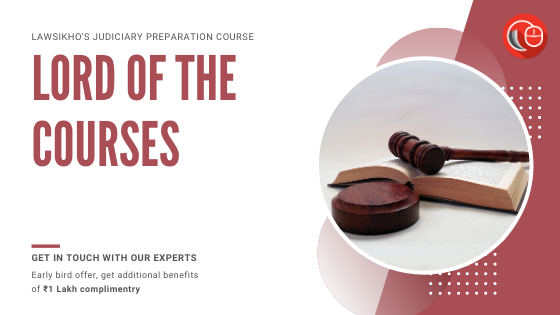
#2 – Opting to attempt the exam for a new state midway into your preparation
It may so happen that while you are preparing for the Delhi, Bihar and UP judicial services exam, you see a notification for Gujarat judicial services.
You feel the temptation to minimize risk further and sit for another exam. Now, here’s the problem.
Attempting the Gujarat judicial services exam requires you to learn Gujarati.
So what? Somebody has announced a 1-month crash course for that. I can pursue that too.
How difficult can it be? After all, isn’t it a good idea to further reduce risk as much as possible?
Never fall into this trap. This will complicate your preparation by several orders of magnitude and you will not even realize it.
If you have a year or less to study, you cannot afford to change the states you are appearing for, especially if you need to learn a new language.
#3 – Assuming that studying hard in college will prepare you for judiciary exams
Isn’t the LLB syllabus similar to the state judiciary exams?
Sure, there is an overlap in some of the LLB subjects with the judicial services exams.
Does it mean that LLB textbooks are a substitute for exam preparation?
Does it mean that writing subjective answers in your final exam will prepare you for Judiciary Mains?
Not at all.
The purpose of your college exam is to enable you to test your learning of the syllabus and class teaching.
100% of the students in your batch can pass the LLB exam if they score minimum passing marks.
The purpose of a competitive exam like the judicial services is very different.
It is to exclude as many as people as possible, letting only the best in.
If there are 50 seats in a state and 50,000 candidates who attempt the exam, only 0.1% of candidates will make it. It does not matter even if you score 90% or 95%.
Even if you are in the top 0.3%, you will be excluded, because only the top 0.1% students will make it.
Do you think the same strategy and preparation will suffice for such an exam as your LLB exam?
#4 – Preparing for prelims exclusively in the hope that you have enough time later to prepare for mains
Cracking the Prelims is the first step, duh!
Why can’t I prepare for Mains later?
Take it from the experiences of those who have failed the mains – there just isn’t enough time later.
You need to prepare for both, Prelims and Mains, simultaneously.
Some candidates start exclusively with interview preparation first.
A disproportionate focus on interview preparation in the initial phases of your preparation will reduce the time you have to prepare for Prelims and Mains.
You don’t need to do that.
I understand that some aspects of your personality will require long-term effort, but make sure that interview preparation does not creep into your time for preparation for mains and prelims.
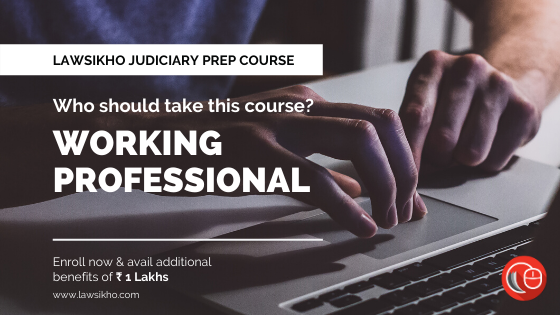
#5 – Not accounting for state-specific differences, especially when there are subject overlaps
When you decide to attempt multiple exams, the level of complexity for your preparation increases significantly.
To the extent that the syllabi for exams in different states vary, you will need to study additional subjects. You will need to focus on additional state-specific subjects. For example, state-level rent and excise laws, which often feature in the syllabus for the judiciary exam of several states, will be different in each state.
Some states will require you to prepare for judgment-writing (included in our Judiciary Test Prep, Lord of the Courses, or available separately here), which is not there in every state’s judicial services exam.
Even for the states which have significant overlaps in their judiciary syllabus, you will need to account for certain differences in the paper pattern – relative weightage of subjects may be different, the types of questions that are asked may be different, and question papers may be evolving in a completely different direction over the years.
All these factors will need to be taken into account when you prepare. Your preparation strategy needs to be very sophisticated to succeed.
Merely solving the past years’ question papers will not be sufficient.
You will need to spend a lot of time comparing different question papers and identifying trends and divergences.
A lot of analysis and insights from past years’ question paper trends is needed – in fact, the better the analysis, the higher your chances of success.
I’ll share a couple of examples from our analysis of the past years’ question papers of Assam Judicial Services below. We provide similar analysis for other states as well in our judiciary course.
Breakdown of English Grammar section for Assam Judiciary
Let us take a look at the screenshot below.
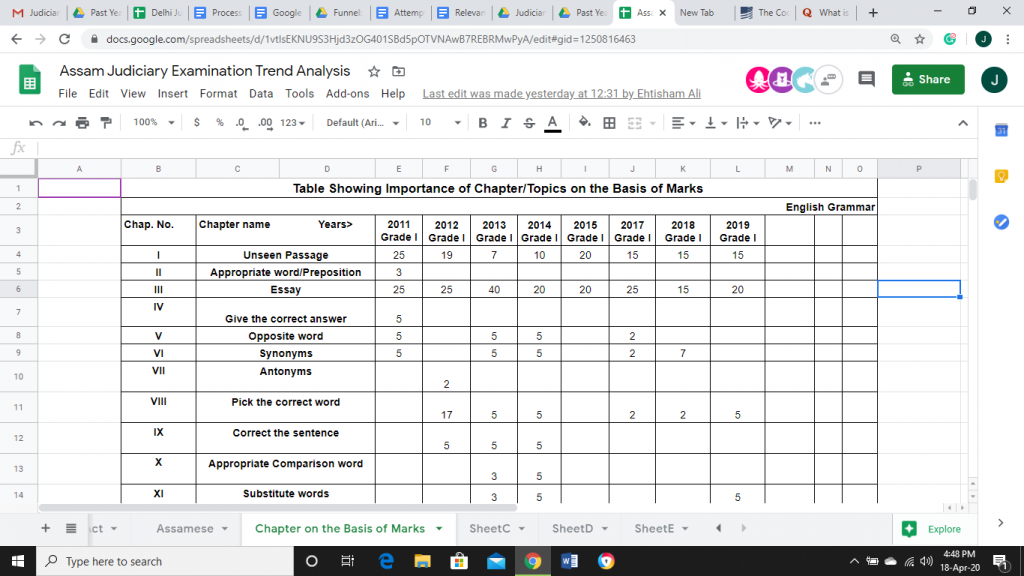
We can see from the above screenshot that questions on ‘Unseen Passage’ have been consistently asked in the past 3 years.
On the other hand, questions on ‘Antonyms’ or ‘Appropriate Comparison Word’ have been very infrequently asked.
Several other inferences can be made. Let’s look at another.
Breakdown of Indian Penal Code for Assam Judiciary
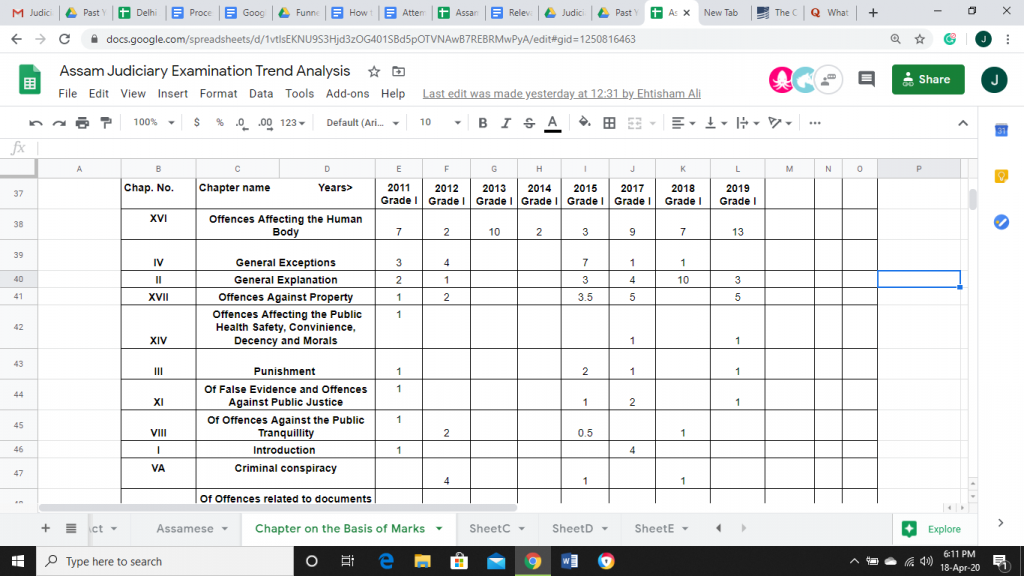
The screenshot above indicates that there has been a very high focus on Chapter XVI, i.e. Offences Affecting the Human Body.
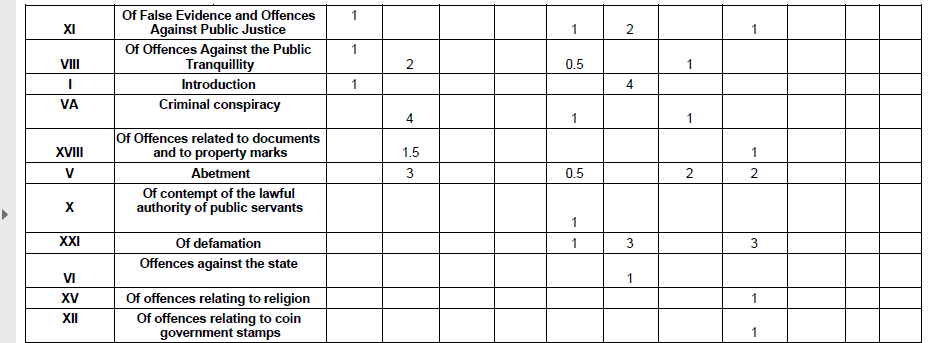
Similarly, this screenshot above shows that Chapter 15 – Offences relating to religion has not been focussed on much.
Therefore, if you are attempting the Assam Judicial Services paper, you can accordingly focus more on Chapter XVI of IPC and focus less on Offences Relating to Religion or Offences Against the State.
What if you could obtain such insights for all the states whose judicial services exam you are attempting?
How much time would it save if you obtained these insights at the right time?
How much time additional time would you get to prioritise your study of important aspects?
How would it impact your chances of cracking one or more judicial services exams?
What do you need to do to get such insights regularly?
It’s simple – get a coach or training program.
Now, for some of you, whether you take coaching or not is a big deal. Of course, if you crack the examination without any training/ coaching, you could save a couple of lakhs.
However, let us look at what happens if, god forbid, you don’t make it.
After all, these are highly competitive exams. One in thousand or even lesser students make it.
You could be really smart and prepare really well, but still not make it, for reasons that may be totally outside your control.
However, if you fail to clear the exam once, it may require another year for you to prepare.
Some of your batch mates who succeed may become judges. Others may start to settle in private sector jobs.
It hurts when everyone else around you is doing well but you are not getting what you deserve, despite putting in your best.
Many candidates feel that their confidence is crushed. They try again, but with lowered confidence. It really impacts their preparation.
Others quit at that stage and pursue litigation or opt for a different career.
Some rush to take coaching.
There goes all your effort to save that money.
If you have a stable job as a judge, all that investment doesn’t hurt at all.
Now, keep in mind that those of you who are studying in a private law college or an NLU would have already spent anywhere between 2 lakhs to 15 lakhs on your LLB degree over the years anyway.
If you are unable to start on the right track, that burden can be heavy.
If you are willing to work hard, follow a coaching program and crack the exam, the investment could be totally worth it.
The choice is yours.
However, you will need to decide ahead of time.
For those of you who are interested in knowing more, here’s how we can help.
Lord of the Courses offers 8 hours of class every week and doubt-clearing sessions, a special judgment-writing course, study materials on state-specific subjects, 2 personal mentorship calls every month, weekly mocks and a library of videos.
We are also offering scholarships of up to INR 1 lakh to the first 50 deserving candidates who have blocked their seats in the program.
Those who are interested can schedule a free coaching session by calling us on 01140845203 or reply to this email with your phone number and a preferable time so that we can get in touch with you.
We are quite excited to be on your side.
Cheers
Abhyuday Agarwal, COO, Lawsikho
(with inputs from Shweta Devgan, Jolly Tewari, Ehtisham Ali)
S. LawSikho is running hour-long webinars every day. Want to learn how to improve your learning skills? Prepare an LLM application to a foreign university? Career opportunities in new, upcoming areas of law? Don’t miss these high-quality webinars with industry and academic experts.
Reply back to this email stating “I want to watch webinars!” and we will personally send you the link to the webinar group on WhatsApp. From then onwards, you will receive instant webinar notifications on your mobile phone only.
P. S. All our premium courses are covered under an unwavering 30 days full money-back guarantee.
After taking a course, if you feel like it is not working out for you, maybe you are not getting enough value out of it or it is not meeting your expectations, just get in touch with us. We will refund every rupee you paid for the course.
No questions asked, as long as the minimum requirements of the refund policy are fulfilled.
LawSikho has created a telegram group for exchanging legal knowledge, referrals and various opportunities. You can click on this link and join:
 Serato DJ Crack 2025Serato DJ PRO Crack
Serato DJ Crack 2025Serato DJ PRO Crack









 Allow notifications
Allow notifications


